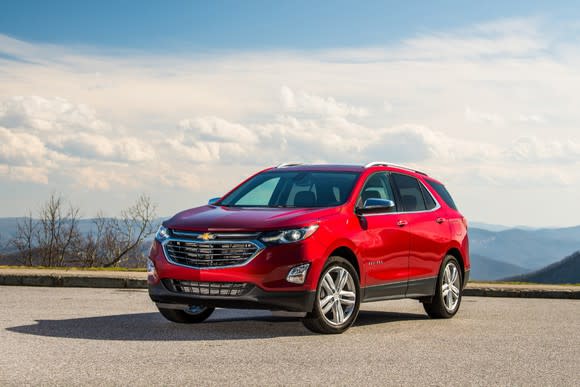The U.S.-Mexico Trade Deal Removes Risk for General Motors
2018 has been bumpy for U.S. automakers. For the past few years, General Motors (NYSE: GM), Ford Motor (NYSE: F), and Fiat Chrysler (NYSE: FCAU) have had to cope with investor concerns about U.S. auto sales having peaked. Over the past year, new concerns have emerged, primarily centered around tariffs.
First, the U.S. imposed tariffs on imported steel and aluminum, causing market prices for both commodities to skyrocket. This has increased U.S. automakers' costs, forcing Ford, GM, and Fiat Chrysler to cut their 2018 profit outlooks last month. Second, the U.S. has threatened to impose tariffs on auto imports, wreaking havoc on automakers' international supply chains.
However, on Monday, the U.S. and Mexico announced that they had reached a tentative deal to update NAFTA and maintain free trade between the two countries. This removes a significant source of risk for the Big Three, but particularly for General Motors.
Depending on Mexico
Beginning in the late 1980s, the U.S. signed free trade deals with Canada and then with Mexico. This encouraged automakers to develop transborder supply chains within North America. Parts are shipped between the U.S., Canada, and Mexico -- supplemented by parts imported from outside the NAFTA region -- to support assembly plants in all three countries.

GM has major manufacturing operations in all three NAFTA countries. Image source: General Motors.
Furthermore, rather than producing vehicles for each market within that country's borders, GM, Ford, and Fiat Chrysler spread their production for the NAFTA region across the three countries. By contrast, the Big Three import very few vehicles to the U.S. from outside NAFTA.
This means that tariffs on auto imports -- and even parts imports -- from outside NAFTA would be manageable for GM, Ford, and Fiat Chrysler. However, tariffs on imports from Mexico and Canada would be devastating.
That said, there are significant differences between the North American production footprints of GM, Ford, and Fiat Chrysler. Most notably, Ford relies significantly less on imports than either of its rivals.
Moreover, GM builds a substantial proportion of its high-margin full-size pickups in Mexico. Indeed, it built more than 400,000 Chevy Silverados and GMC Sierras at its Silao, Mexico, factory last year. Most of those were sold in the United States. Fiat Chrysler has also been building full-size trucks in Mexico, but it announced early this year that it will move production of its Ram Heavy Duty trucks back to the U.S. by 2020. At that point, GM will be the only one of the Big Three to import one of its most important (and most profitable) products from Mexico.

GM builds a substantial proportion of its Chevy Silverados in Mexico. Image source: General Motors.
Free trade in autos -- with some restrictions
Fortunately for GM, it now seems likely that free trade between the U.S. and Mexico will continue. Under the deal announced on Monday, vehicles will need to have at least 75% of their content come from within the NAFTA region to avoid tariffs. Additionally, at least 40% to 45% of each auto's content would have to be made by workers earning at least $16 per hour. The agreement is set to last for 16 years, with a review every six years that can extend it further.
In effect, the U.S.-Mexico trade deal incentivizes auto suppliers to move production from outside the NAFTA region to Mexico to meet the 75% content requirement. It also encourages suppliers and automakers to keep substantial manufacturing bases in the U.S. and Canada, to meet the wage requirement. (Alternatively, they could raise wages in Mexico.)
Canada has not yet agreed to revisions to NAFTA, but it was set to resume negotiations with the U.S. on Tuesday. The goal is to conclude a new trilateral deal by the end of the week. That said, U.S. officials have warned that in the absence of a deal, the administration plans to impose tariffs on auto imports from Canada.
Too early to celebrate, but it's a start
General Motors won't be satisfied by the renegotiated trade deal unless it ultimately includes Canada as well. The automaker's popular Chevy Equinox compact SUV is primarily assembled for the U.S. market in Canada, although a significant number are built in Mexico as well.
However, with Mexico apparently willing to forge a bilateral pact with the U.S. if necessary, it will be hard for Canada to continue holding out for better terms. And even if the U.S. imposes tariffs on Canadian auto imports, this would be a lot easier for GM (and other automakers) to stomach than tariffs on Mexican imports.
GM isn't totally in the clear yet with regard to potential harm from auto tariffs. Nevertheless, the risk of facing a major disruption has been greatly diminished by the tentative U.S.-Mexico trade agreement announced on Monday.
More From The Motley Fool
Adam Levine-Weinberg owns shares of Ford and General Motors. The Motley Fool recommends Ford. The Motley Fool has a disclosure policy.
